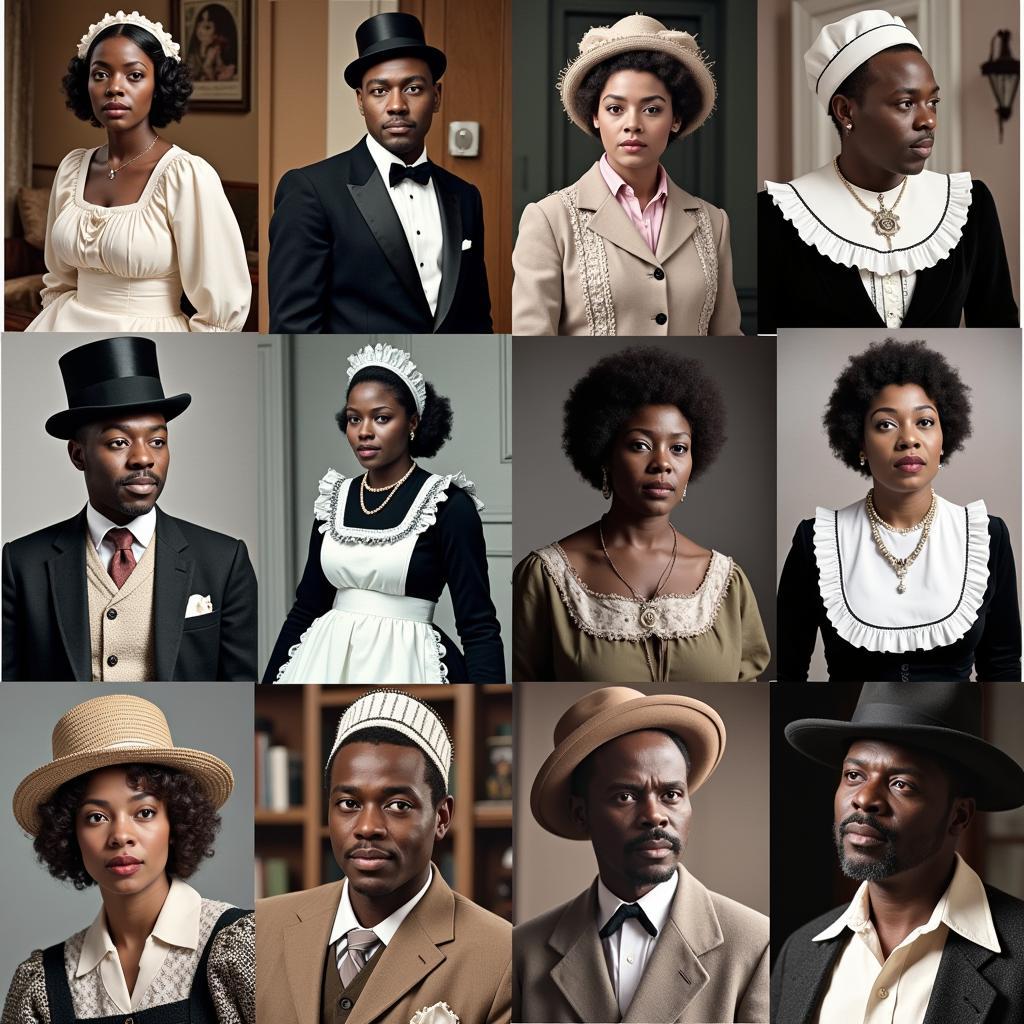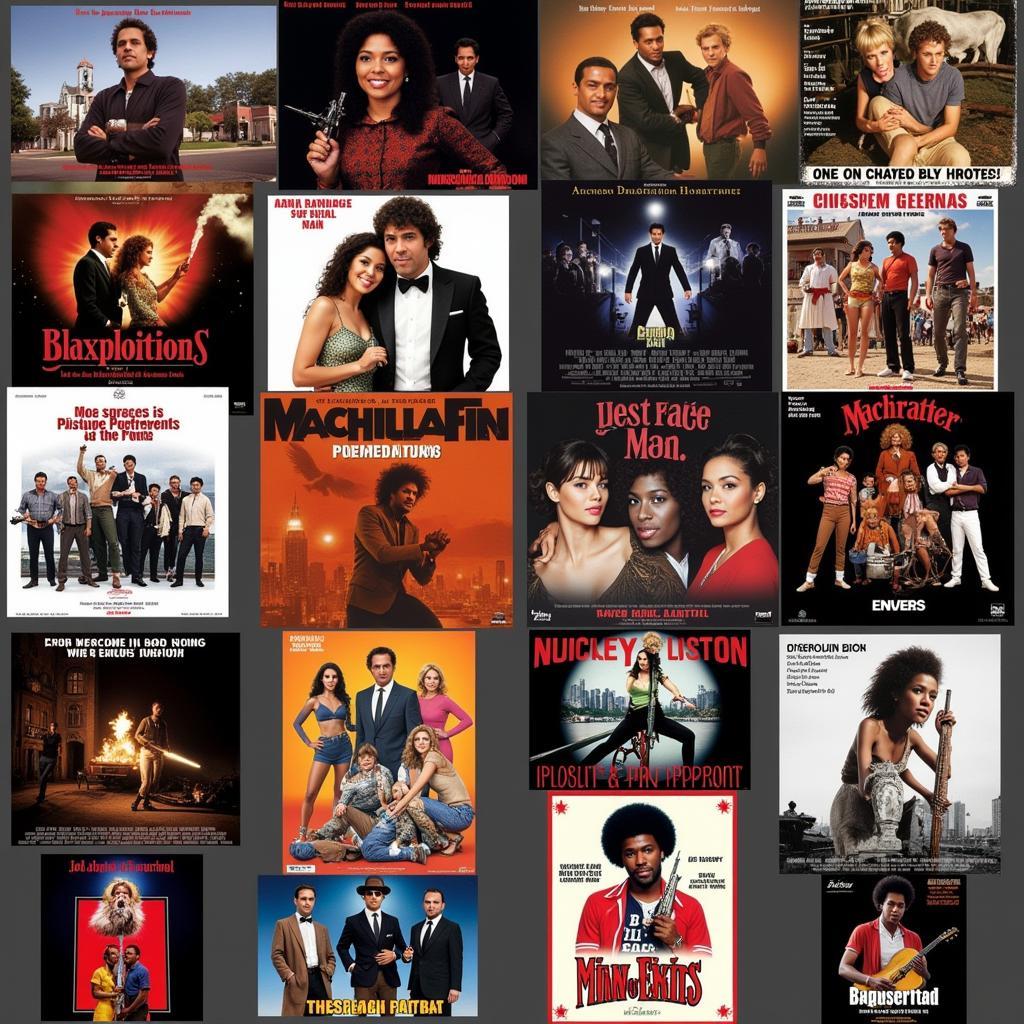African Americans in Cinema: A Journey Through Representation
African Americans In Cinema have a rich and complex history, marked by both triumphs and tribulations. From the early days of stereotypical portrayals to the rise of Black filmmakers and actors who are reshaping the narrative, their impact on the film industry is undeniable. This article explores the evolution of African American representation in film, highlighting key milestones and discussing the ongoing struggle for authentic and diverse storytelling.
The Early Years: Stereotypes and Struggle
 Early African American Film Stereotypes: Depictions of subservient roles and exaggerated characteristics.
Early African American Film Stereotypes: Depictions of subservient roles and exaggerated characteristics.
The early years of cinema were unfortunately characterized by racist and demeaning portrayals of African Americans. Often relegated to stereotypical roles like maids, butlers, and minstrels, Black characters were rarely afforded the dignity of complex personalities or nuanced storylines. These harmful representations reinforced existing prejudices and limited opportunities for Black actors and filmmakers. The film “Birth of a Nation” (1915), while a technical achievement, is a prime example of this era’s problematic depictions, glorifying the Ku Klux Klan and perpetuating harmful stereotypes.
The Rise of Independent Black Cinema
As Hollywood continued to perpetuate harmful stereotypes, Black filmmakers began creating their own narratives. african americans in cinematography played a vital role in challenging the dominant narrative and offering alternative perspectives. These independent films, often produced with limited resources, provided a platform for Black stories to be told authentically and without the filter of white gaze.
One such pioneer was Oscar Micheaux, who wrote, produced, and directed dozens of films in the early to mid-20th century. His work tackled complex themes like racial injustice and class inequality, paving the way for future generations of Black filmmakers. This era saw the emergence of a distinct Black cinematic aesthetic, exploring themes of identity, community, and resilience.
Blaxploitation and Beyond
The 1970s ushered in the era of Blaxploitation films. While often criticized for their stereotypical portrayals of inner-city life and violence, these films also provided a platform for Black actors to take on leading roles and showcase Black culture. Films like “Shaft” and “Super Fly” became cultural touchstones, reflecting the social and political climate of the time.
 Blaxploitation Films and Their Cultural Impact: Exploring complex legacies.
Blaxploitation Films and Their Cultural Impact: Exploring complex legacies.
Following the Blaxploitation era, filmmakers like Spike Lee emerged, pushing the boundaries of cinematic storytelling with films like “Do the Right Thing” and “Malcolm X.” african american drama movies 2018 continued to gain recognition, further solidifying the importance of diverse voices in cinema. These films tackled complex social and political issues with nuance and power, challenging audiences to confront difficult truths.
The New Millennium: A Wave of Change
The 21st century has witnessed a remarkable shift in African American representation in cinema. abusing african american movie scene is still unfortunately common, but positive change continues. Directors like Ava DuVernay, Barry Jenkins, and Ryan Coogler have created critically acclaimed and commercially successful films that center Black experiences. “Moonlight,” “Selma,” and “Black Panther” are just a few examples of films that have broken barriers and redefined what’s possible in Hollywood. african american full movies are now more readily accessible than ever before.
What is the current state of African American representation in film?
While significant progress has been made, there is still work to be done. The industry needs to continue to support Black filmmakers, create more opportunities for Black actors in diverse roles, and ensure that Black stories are told authentically and respectfully.
How has African American slang influenced cinema?
african american slang words have often found their way into film dialogue, adding authenticity and cultural richness to the portrayal of Black characters and communities. This linguistic influence can enhance the realism and impact of storytelling.
Conclusion
The journey of African Americans in cinema is a testament to their resilience, creativity, and unwavering commitment to telling their stories. From the early struggles against stereotypical portrayals to the groundbreaking achievements of contemporary Black filmmakers, African Americans in cinema have shaped and continue to shape the landscape of the film industry. The future of representation rests on continued efforts to amplify diverse voices and ensure equitable opportunities for all.
FAQ
- Who are some influential African American filmmakers?
- What are some key milestones in African American cinema history?
- How has Blaxploitation impacted the film industry?
- What challenges do African American filmmakers still face today?
- Where can I find resources to learn more about African American cinema?
- What are some examples of films that challenge stereotypical representations of African Americans?
- How can I support Black filmmakers and actors?
Need support? Contact us 24/7: Phone: +255768904061, Email: kaka.mag@gmail.com, Address: Mbarali DC Mawindi, Kangaga, Tanzania.


